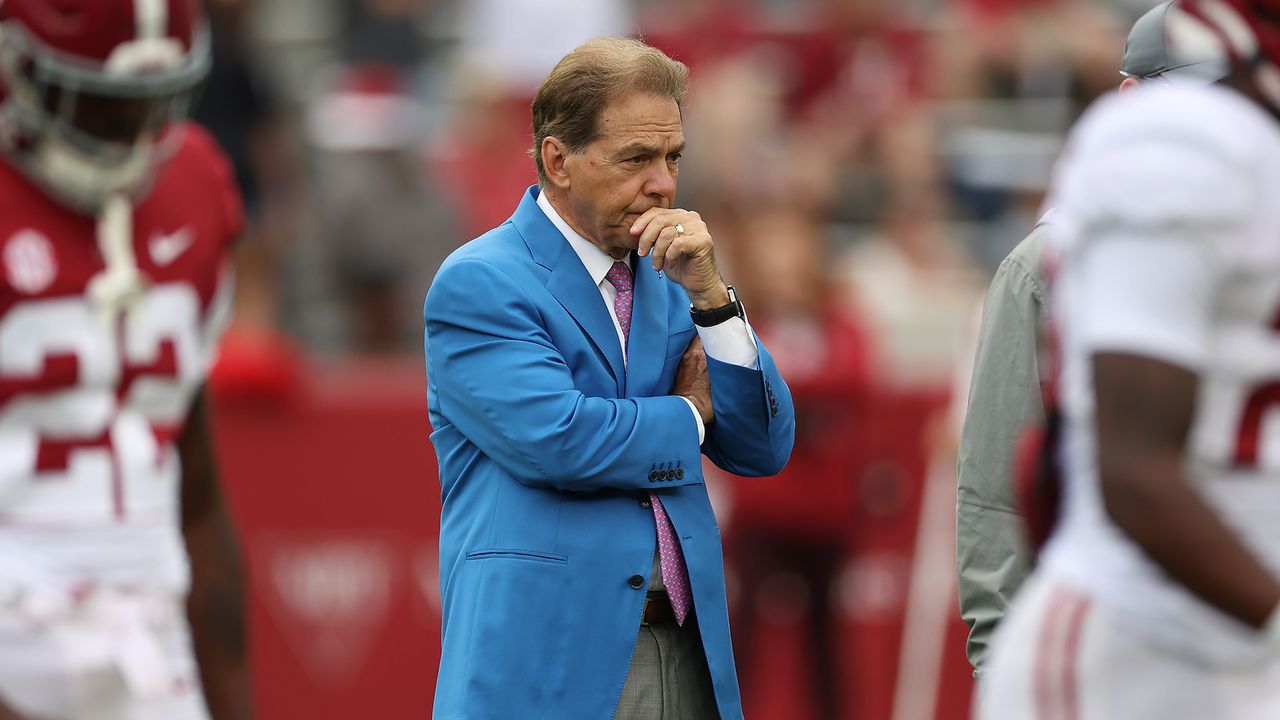Goodman: For Nick Saban, decisions have consequences
Leave it to Nick Saban to set the record straight on the consequences of making poor decisions.
It needed to be done whether Saban fully understood how it would all be perceived or not. It needed to be said no matter how inconvenient the timing, too. Here’s why. It was just a legendary football coach doing his job when one of his players messed up.
Usually this column is about speaking truth to power, but this time it’s about the powerful speaking unfiltered truths that everyone needs to hear. For Alabama, even Saban-speak is tricky stuff these days.
A young Alabama football player was arrested last week with large amounts of marijuana and a loaded gun in his car. Tony Mitchell was a celebrated recruit from Thompson High in Alabaster. Now the former five-star prospect, Saban said on Monday, is suspended from the football team indefinitely. Saban said he needs to understand the situation a little better before making any more decisions.
For a coach, that’s pretty typical stuff.
“Everybody’s got an opportunity to make choices and decisions,” Saban said during a news conference to kickoff the beginning of spring football. “There’s no such thing as being in the wrong place at the wrong time.”
That last line bears repeating: “There’s no such thing as being in the wrong place at the wrong time.”
RELATED: Tony Mitchell suspended by Alabama after arrest
RELATED: Tony Mitchell evaded police at 141 mph, report says
RELATED: Nate Oats says San Diego State has an advantage
RELATED: San Diego State coach says team good enough to beat Tide
These are complicated days for Alabama athletics, but it’s never a bad thing for Saban to offer some of his classic, simple, clear, irrefutable words of wisdom. Mitchell, according to police, was driving in Holmes County, Florida, going a little too fast. Mitchell then sped off in his black Dodge Challenger, according to the police statement, reaching 141 mph.
The police statement is a little confusing, so I understand what Saban meant by needing to gather some more information. Stuff gets left out sometimes. In cases like this, important details aren’t always known or understood right away. But was Mitchell in the wrong place at the wrong time? One-hundred percent.
Did he make poor decisions? Absolutely.
There were two people in the Challenger, Mitchell and a passenger identified as Christophere Lewis. According to the report, Lewis said the gun in the car wasn’t his. Mitchell, who apparently had a concealed weapons permit, couldn’t “describe the firearm” to the arresting officer.
In the end, it was Lewis who was charged with possessing a firearm without a permit.
From the police statement: “I asked if there were any firearms in the vehicle to which Mr. Lewis admitted there was but was not his and he did not possess a concealed weapons permit. Mr. Mitchell who had a concealed weapons permit was unable to describe the firearm to Lt. Morris. The firearm (Spring Field 9mm) was between the front passenger seat and center console concealed from ordinary view with one live round within the chamber and two live rounds within the magazine that was seated within the magazine well of the firearm.”
Whose gun was hidden in Mitchell’s Dodge Challenger? It’s a mystery.
Not a mystery: Mitchell’s punishment for his involvement in alleged criminal activity. Saban explained his reasoning for everyone to understand.
“You’ve got to be responsible for who you’re with, who you’re around and what you do — who you associate yourself with and the situations that you put yourself in,” Saban said. “It is what it is, but there is cause and effect when you make choices and decisions that put you in bad situations.”
Those are powerful words even if Saban uttered them without considering, or even understanding, how they would be perceived. We’re not going to avoid the obvious here. Nate Oats is the Alabama basketball coach who set off a firestorm a few weeks ago when he described basketball player Brandon Miller as being in the “wrong spot at the wrong time” of the shooting that took the life of Jamea Harris.
It was Miller who, according to police, transported a fully loaded gun to the scene of the shooting. Police say that basketball player Darius Miles texted Miller to bring him his gun, which, according to the police, was in the backseat of Miller’s car when he arrived on the scene. Many bad decisions were made that night, and the effect of those decisions put one person in particular in the wrong place at the wrong time, and that was Jamea Harris.
For his insensitive words, Oats issued a public apology. The shooting was on Jan.15. Basketball player Darius Miles was charged with capital murder and so was Miles’ friend, Michael Davis. Police say that Davis used Miles’ gun in the shooting that killed Harris. Miller’s involvement in the case wasn’t made public until a pretrial hearing on Feb. 21. On Friday, Miller and the Alabama basketball team play a game against San Diego State in the Sweet 16.
Under that backdrop, Saban’s words about the importance of making good decisions speak volumes.
Maybe Saban knew about Oats’ comments, and maybe he didn’t. It doesn’t matter in the end. What matters is Saban made the correct decision in suspending Mitchell, and then used his power to speak a truth. There is a difference between facts and truth. Truth understands right from wrong.
Joseph Goodman is the lead sports columnist for the Alabama Media Group, and author of “We Want Bama: A season of hope and the making of Nick Saban’s ‘ultimate team’”. You can find him on Twitter @JoeGoodmanJr.
